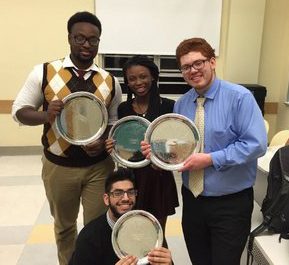Barry Carter | The Star-Ledger | Email the author | Follow on Twitter

On one side of the bracket, SunHee Simon,of Newark’s Science Park High School, was carefully working her way through the competition, taking out some of the top debaters in the country.
On the other side of the bracket, her teammates Christian Quiroz and Adegoke Fakorede methodically picked apart elite opponents with skillful reasoning.
Think of it as the NCAA college basketball tournament. Win and you move on. Lose and you go home.
Science Park wasn’t having anything to do with defeat as its members argued this question of social justice: “Should a just government require employers to pay a fair living wage.”
The seniors from Science Park were at the University of California, Berkeley, participating in one of the largest national debate tournaments in the country. Out of more than 300 debaters, they would run the table – taking first, second and third place in the competition.
Coach Jonathan Alston says Simon, the top debater on points, reached the final by defeating a student from Greenhill Academy, an elite public school from Dallas. She shares the championship with Quiroz, who was in the debate version of the Final Four against Fakorede. Rather than debating his teammate in that round, Quiroz advanced to the finals over Fakorede because he had a better record. A fourth member of the team, junior Amit Kukreja, was doing well until he got bumped in round 32. Not bad for the co-champion of another tournament, which he won with Quiroz.
“We know our arguments better and we know what we’re probably saying is stronger,” says Simon.
In this mental arena, Alston and other debate coaches say Science’s accomplishment is extremely difficult, especially when seven out of the top 10 student debaters in the country participated.
“I’ve been doing this 30 years and I have never known three students from the same school to be in the top four at a major national event,” says Aaron Timmons, debate coach at Greenhill Academy, which took fourth place.”You’re talking about students who are competing against the best and the brightest from public and private high schools all across the country.”
The feat, more than anything, continues to validate the successful program that Science has built during 35 years. It started under Brent Farrand, who created the debate team at Science before expanding the activity to Newark’s middle and high schools.
Science was so good, it had a 20-year streak of winning championships. That ended in 2002, but the setback eventually propelled them to national heights. They began working with the University of Rutgers-Newark debate team, whose students were fifth in the country last year. Two of the Rutgers’ team members, Elijah Smith and Chris Randall, have been assistant coaches for this Science Park team, which has earned significant wins this season.
Simon and Fakorede qualified for the national tournament of champions in two areas: policy debate and Lincoln-Douglas debate, which deals with questions of social justice and morality. The achievement is particularly outstanding, Alston says, because students generally only qualify for one of these categories.
The team has earned first place at two major national tournaments, including Berkeley, and scored top honors at a series of regional tournaments.”This level of dominance is higher than most,” Alston says.
Step back and stack that on top of Simon’s selection to the USA national debate team. She’s in Slovenia this week and headed to Singapore this summer.
At Berkeley, the Science teammates weren’t surprised to see each other advancing. They don’t fear the competition, only when facing one other. “At the end of the day, we work really hard,” Fakorede says.
The students are passionate about critical race issues, such as reparations and black nationalism, two topics they explored as they answered the living wage question.
Each of them approached the subject differently.
Fakorede is bold. He allows the competition to pick the side he or she wants to debate, because he’s that confident in his lyrical presentation. Using spoken word poetry, Fakorede addressed the living wage issue and reparations in the case of Clyde Ross, the true story of a black man whose family had no protection under the law when the state of Mississippi took its land under Jim Crow policies.
Simon, like Quiroz, is deeply philosophical and technical. She redefined living wage as reparations on one hand and, on the opposite side of the debate, she said black nationalism would force the black community to rely on itself if its members were denied a living wage.
Now, listen to Quiroz, who has a thoughtful commentary on how society should value humanity:
“When you are required to say these people deserve to live as a product of their work or their productivity, we necessarily recognize that they are people who deserve to live and that’s what changes the atmosphere in the work place, because they are not simply objects of exploitation, rather they are producers who produce for society to flourish but they also have a right to flourish themselves.”
The team takes on competitors who, at times, have rejected Science’s arguments on race issues, contending that they are off-topic, unfair and not predictable enough to discuss.
The strategy often fails, Alston says,because his team is good at debate within the debate. The team challenges the notion of unfairness by telling the competition that their avoidance tactic is rooted in social injustice and is an attempt to rob those who want to debate an opportunity for robust dialogue.
And with that, the opponent is pinned to the mat.
One, two, three.
It’s over.